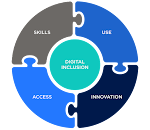Finding Jobs with Visa Sponsorship in 2024: A Comprehensive Guide
In today's globalized job market, securing employment opportunities with visa sponsorship has become increasingly important for professionals seeking to work abroad.
However, the process can be daunting, especially when navigating unfamiliar terms or company-specific programs.
In this comprehensive guide, I'll provide you with valuable insights, resources, and strategies to help you find jobs with visa sponsorship in 2024.
Understanding Visa Sponsorship
Before we delve into the job search process, it's essential to understand what visa sponsorship entails. Visa sponsorship is a process where an employer agrees to sponsor a foreign worker's visa application, allowing them to legally work in the country.
This sponsorship is often required for non-citizens to obtain work visas or employment-based immigration status.
Visa sponsorship can be a complex and time-consuming process, involving substantial paperwork, legal requirements, and financial obligations for the employer. As a result, not all employers are willing or able to sponsor foreign workers, especially for entry-level or unskilled positions.
Identifying Industries and Jobs with Visa Sponsorship Opportunities
While the term "trac jobs" may refer to a specific company or program, there isn't a direct correlation between this term and visa sponsorship opportunities. Instead, it's more effective to target industries and job roles that are known to have a higher likelihood of offering visa sponsorship.
Here are some industries and positions that are commonly associated with visa sponsorship opportunities:
1. Healthcare
The healthcare industry has a high demand for skilled professionals, making it a prime sector for visa sponsorship opportunities. Positions such as nurses, therapists, and some technician roles may be eligible for sponsorship, particularly in areas with healthcare worker shortages. To find sponsored healthcare jobs, you can explore hospital websites, job boards like [NHS Jobs](https://www.jobs.nhs.uk/), or industry-specific job portals.
2. Hospitality
The hospitality industry, including hotels, restaurants, and resorts, often relies on international talent and may sponsor visas for positions such as chefs, housekeepers, or waiters/waitresses. These sponsorship opportunities are particularly common in seasonal or high-demand locations where local labor supply is limited.
3. STEM Fields (Science, Technology, Engineering, and Mathematics)
Companies in STEM fields frequently face skill shortages and may be more willing to sponsor visas for qualified professionals in areas like software engineering, data science, or biotechnology. When searching for STEM jobs with visa sponsorship, utilize general job boards and filters for keywords like "visa sponsorship" or "work permit assistance."
4. Education
International schools and educational institutions often sponsor visas for teachers, especially in niche subjects or specialized curricula. These opportunities can be found through job boards, school websites, or educational recruitment agencies.
Strategies for Finding Jobs with Visa Sponsorship
While the industries mentioned above are more likely to offer visa sponsorship opportunities, there are several strategies you can employ to increase your chances of finding suitable positions:
1. Utilize Job Board Filters and Keywords
When searching for jobs on popular job boards like Indeed, Reed, or Totaljobs, use keywords such as "visa sponsor," "work permit assistance," or "immigration support" in combination with your desired job title or field. Many job boards allow you to filter your search results to include only positions that offer visa sponsorship.
2. Explore Official Government Websites
Official government websites for immigration and employment services can be valuable resources for understanding visa sponsorship requirements and sponsored work visa programs. These websites often outline eligibility criteria, application processes, and lists of in-demand occupations that may qualify for sponsorship.
3. Check Company Career Websites
Some companies with a history of sponsoring visas may explicitly mention their willingness to do so on their careers page or job postings. Look for sections titled "International Recruitment," "Visa Sponsorship," or similar keywords. These companies may also provide detailed information on their visa sponsorship processes and requirements.
4. Leverage Professional Networks
Networking can be a powerful tool in your job search, especially when it comes to visa sponsorship opportunities. Reach out to your professional connections, industry associations, or alumni networks to inquire about potential job openings or employers known to sponsor visas in your field.
5. Consider Temporary Staffing Agencies
Some temporary staffing agencies or recruitment firms specialize in placing international talent and may offer visa sponsorship services. Working with these agencies can streamline the process and provide access to a wider range of job opportunities with sponsorship.
6. Attend Job Fairs and Industry Events
Attending job fairs, career expos, or industry events can be an excellent way to connect with potential employers face-to-face and learn about their visa sponsorship policies. These events often attract companies actively seeking international talent and may provide valuable insights into their hiring processes.
Enhancing Your Chances of Success
While finding jobs with visa sponsorship can be challenging, there are several strategies you can employ to enhance your chances of success:
1. **Build a Strong Professional Profile**: Ensure your resume, cover letter, and online presence (e.g., LinkedIn profile) are up-to-date and highlight your relevant skills, qualifications, and experience. Employers sponsoring visas often seek highly qualified candidates who can bring valuable expertise to their organization.
2. **Highlight Relevant Experience and Certifications**: If you have prior experience working in a multinational or multicultural environment, be sure to emphasize it in your application materials. Additionally, highlight any relevant certifications or licenses that demonstrate your expertise and commitment to your profession.
3. **Demonstrate Cultural Adaptability**: Employers sponsoring visas often seek candidates who can adapt well to new cultural environments and work effectively in diverse teams. Showcase your cross-cultural communication skills, language proficiency, and openness to new experiences.
4. **Prepare for Interviews**: Be prepared to answer questions about your motivation for seeking employment abroad, your understanding of the visa sponsorship process, and your long-term career goals. Research the company and the role thoroughly to demonstrate your fit and commitment.
5. **Be Flexible and Open-Minded**: While you may have a specific job or location in mind, it's important to remain flexible and open-minded when it comes to visa sponsorship opportunities. Be willing to consider alternative roles or locations that align with your skills and career aspirations.
6. **Stay Persistent and Patient**: Finding a job with visa sponsorship can be a lengthy process, and you may face rejections or delays along the way. Remain persistent, patient, and continue to refine your job search strategies while maintaining a positive and professional attitude.
Conclusion
Finding jobs with visa sponsorship in 2024 can be a challenging but rewarding endeavor for professionals seeking international career opportunities. By understanding the industries and positions more likely to offer visa sponsorship, utilizing effective job search strategies, and enhancing your professional profile, you can increase your chances of securing a sponsored role.
Remember, the visa sponsorship process can be complex and vary significantly depending on the country, employer, and your specific circumstances. It's essential to thoroughly research the requirements, seek guidance from immigration professionals or legal experts when necessary, and remain patient and persistent throughout the process.
With determination, adaptability, and a willingness to explore new opportunities, you can navigate the challenges of finding jobs with visa sponsorship and embark on an exciting international career journey.
Frequently Asked Questions (FAQ)
1. What is the difference between visa sponsorship and a work visa?
Visa sponsorship is the process by which an employer agrees to sponsor a foreign worker's visa application, while a work visa is the actual legal document that allows the individual to work in the country. Visa sponsorship is typically a prerequisite for obtaining a work visa, as the employer's sponsorship is often required for the visa application process.
2. Can I apply for visa sponsorship directly, or do I need a job offer first?
In most cases, you will need to secure a job offer from an employer willing to sponsor your visa before applying for the visa itself. The employer typically initiates the visa sponsorship process on your behalf as part of the hiring process.
3. Are there any industries or job roles that are more likely to offer visa sponsorship?
While visa sponsorship opportunities can vary depending on the country and job market, certain industries and job roles are more likely to offer sponsorship. These include healthcare (nurses, therapists, technicians), STEM fields (software engineering, data science, biotechnology), hospitality (chefs, housekeepers, waiters/waitresses), and education (teachers, especially for niche subjects or international schools).
4. How long does the visa sponsorship process typically take?
The duration of the visa sponsorship process can vary significantly depending on the country, visa type, and specific circumstances. It can take several weeks to several months, or even longer in some cases, to complete the necessary paperwork, obtain approvals, and finalize the visa sponsorship process.
5. Can I bring my family members with me if I secure a job with visa sponsorship?
The ability to bring family members often depends on the specific visa program and the regulations of the destination country. Some visa programs may allow you to include dependents, such as your spouse and children, while others may be limited to the individual worker. It's crucial to understand the specific visa conditions and requirements before making any arrangements for family members.
6. What happens if my visa sponsorship expires or my employment is terminated?
If your visa sponsorship expires or your employment is terminated, you may be required to leave the country within a specified grace period. The consequences can vary depending on the country and your specific circumstances, but it's essential to comply with the visa regulations and consult with immigration authorities or legal experts to understand your options and potential implications.
7. Are there any specific qualifications or requirements I should focus on to increase my chances of finding a job with visa sponsorship?
While specific qualifications and requirements can vary based on the industry and job role, some general factors that can increase your chances of finding a job with visa sponsorship include:
- Relevant education and certifications in your field
- Specialized skills or expertise in high-demand areas
- Fluency in multiple languages
- Prior experience working in multinational or multicultural environments
- Strong interpersonal and cross-cultural communication skills
Remember, the information provided in this article is general guidance, and specific visa requirements and regulations can change over time. It's always recommended to consult official government sources and seek professional advice from immigration experts or legal professionals when necessary to ensure you have the most up-to-date and accurate information for your unique situation.

